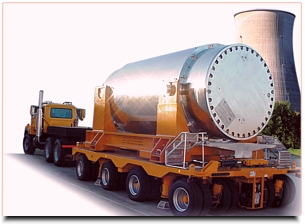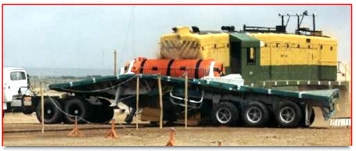
- On This Page
- Who's In Charge
- Resource Documents
Who's In Charge
The U.S. Nuclear Regulatory Commission (NRC) is an independent agency established by the U.S. Congress in 1974 to ensure adequate protection of public health, safety, and the environment in the use of nuclear materials. The NRC regulates commercial nuclear power reactors; non-power research, test, and training reactors; and fuel cycle facilities. The NRC also regulates medical, academic, and industrial uses of nuclear materials, as well as packaging for the transport, storage, and disposal of nuclear materials and waste. In
addition, the NRC regulates the design, manufacture, use, and maintenance of containers for high level radioactive shipments
 The U.S. Department of Transportation (DOT), in coordination with the NRC, sets rules governing the packaging of nuclear materials. With NRC and the affected states, DOT regulates the transport of nuclear materials. The DOT also regulates carriers of nuclear materials, sets standards for transportation routes, and is responsible for international agreements on the transport of all hazardous materials.
The U.S. Department of Transportation (DOT), in coordination with the NRC, sets rules governing the packaging of nuclear materials. With NRC and the affected states, DOT regulates the transport of nuclear materials. The DOT also regulates carriers of nuclear materials, sets standards for transportation routes, and is responsible for international agreements on the transport of all hazardous materials.
The U.S. Department of Energy (DOE), among other things, oversees the development of disposal systems for spent nuclear fuel from the nation's nuclear power plants. This activity has been entirely funded by fees collected from nuclear power plant companies and ultimately from rate payers.
Resource Documents
May, 2012 — Spent Fuel Transportation Risk Assessment — Nuclear Regulatory Commission [NRC]
October, 2011 — Repository Transportation Planning, Risk Management, & Public Acceptance: Lessons Learned — State of Nevada [Summary Slides]
March, 2003 — NRC's role in the safe transportation of spent nuclear fuel from commercial nuclear power plants. This documents discribes NRC role concerning the design, manufacture, use, and maintenance of containers for radioactive shipments. [16 Pages PDF ] [More from the NRC]
] [More from the NRC]

